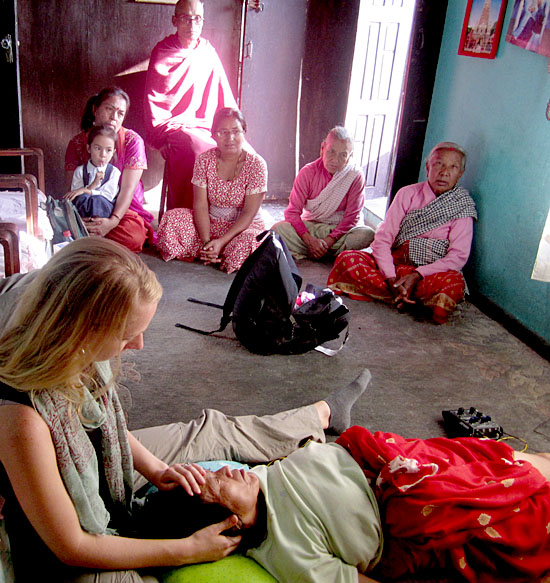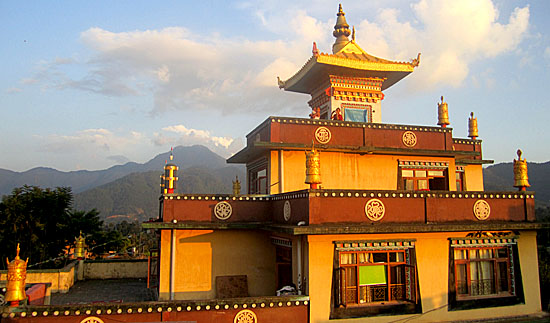
This would be my 6th trip to Nepal, but my first time experiencing it during monsoon. The valley was bone dry when I last left and after 7.5 months without rain everything was covered in a heavy layer of dust. Today, the valley is a sea of green and mud from months of monsoon. When it rains, it’s as though a wall of water is falling for hours at a time. But the air is clean, the temperature and humidity much more manageable than the 90+ degrees in Kathmandu with humidity trapping in the pollution.
It feels like a homecoming for me, I am very excited to see my “Nepal family”; ARP staff, friends, Monks, patients, and even the dogs. I am greeted by big smiles, prayer hands, blessings, wagging tails, chai tea, and an excited monk running into me around a corner when he hears of my arrival.
I look out the window and I see my “favorite stroke patient”, Mr. Thapa. He is the 43 year old Nepali police officer who suffered a severe stroke over 10 years ago. We have reported on his case and development over the last 3 years. Today he is 30 minutes early and waiting for the clinic to open, squatting on his heels in the alley. This is a new range of motion I have not seen from him before. He is excited to show me a lot of other new ranges of motion he has gained through his acupuncture treatments. He puts both his right arm and leg through almost noodle -like dance motions, he is thrilled with the treatments, the level of care, and his improvement. At this point he comes to work on his speech and excess saliva. Anne Frances will work with him 3 times a week for the next month focusing mainly on scalp acupuncture. 2 weeks later his speech is clear, the saliva level is no longer an issue and suddenly he is speaking English! He has always used some English words and fragmented sentences but he is now conversational. It’s hard for everyone in the room to contain their joy, excitement and laughter. Before the stroke, Mr. Thapa spoke multiple languages (Nepali, Nawari, Hindi, and English). Immediately after the stroke it was only Hindi which remained, interestingly not his first language. So the question that now comes to mind; does he now feel confident enough with the decreased saliva level to speak more English? Or did the scalp treatment awaken a part of his brain that has been asleep for years?
One day after Mr. Thapa's speech improvement, I saw an article published in the Kathmandu Times that reported a study in Korea and Germany has found that Acupuncture is not effective in helping with post stroke rehabilitation. I literally laughed out loud.
ARP and the Vajra Varahi Clinic continue to be a welcome part of the Chapagaon community. We treat multiple patients from the same and extended families as word spreads of the level of care and the results from acupuncture and herbs. Some patients still hike multiple hours each way, out of the hills for treatment. This year I met a family who had rented a room in the village so the husband could receive treatment for his stroke multiple times a week. We also had an opportunity to perform a house call on an older woman who had just experienced a stroke only 6 days earlier. This is a rare opportunity for ARP as most of our stroke patients suffered from their episode years earlier. Treating the patient on the floor, both Anne Frances and I began to work. When we finally looked up from our patient we were surrounded by her friends and family of all generations, a monk, and our taxi driver all whom were sitting cross legged and praying for her. It was an amazing lesson in the power of group healing and prayer.

Years ago I had the privilege of studying under an acupuncturist who referred to all his patients as his teacher. Each patient gave him the unique opportunity to learn something new about not only the individual in his office, but also the medicine and himself all from the perspective of his patient/ teacher. I have tried to keep this in mind during both my travels and treatments. My greatest teacher on this trip has been a 68yr old man with Parkinson’s. He has taken all the pharmaceuticals for his condition and after years the medication is no longer effective. His shaking is uncontrollable, but he has learned that by keeping beetle nut in his mouth his speech is not a problem. He looked at me one day during treatment and asked if this condition was something that he had caught from someone and was worried that he might pass it along. He said that people avoid him on the bus and out in the village, some fearful that he has been bitten by a demon, causing his shaking. It was eye-opening to me; I see a man with Parkinson’s but to most in Nepal this condition is a mystery that holds quite a stigma as a result of lack of understanding. Even with all the difficulties that Parkinson has presented to his life, his real fear was about passing it along to a stranger. I am very grateful for the new perspective my teacher has given to me.
I would like to thank all those who have and continue to help support our project. It is a blessing to be of service to the wonderful people of Nepal.
– Namaste, Leith Nippes

Admin note: Leith Nippes is a co-founder of the Acupuncture Relief Project and serves on the Board of Directors. Without Leith's endless energy, enthusiasm and dedication to inspiring our community of acupuncture practitioners all over the world... this project would not be possible.











